This May, the British section of the International Marxist Tendency is launching the Revolutionary Communist Party. We publish here a draft document that will form the basis for the central discussion at the founding congress, outlining the perspectives and tasks facing communists in Britain.
[Originally published at communist.red]
Capitalism worldwide is in a state of terminal decline. The deep slump of 2008-09, which resulted in an unprecedented collapse, proved to be a qualitative turning-point of the world crisis, compounded by the further slump and pandemic of 2020-21.
The capitalists only managed to avoid a depression by one of the greatest state bailouts in the history of capitalism, which, according to the logic of their system, must now be paid back by the sacrifices of the working class.
All the accumulated contradictions of the past period are bursting to the surface with dramatic effect. Unprecedented volatility and instability reigns everywhere, and at all levels: economic, social, political, military, diplomatic, environmental.
The latest shock, in a series of shocks to the system, has been the war in Gaza, which has intensified the upheavals and added fuel to the fires of discontent everywhere.
There will be many other shocks and sources of instability to add to the turmoil in the period opening up. We are in an epoch of sharp turns and sudden changes.
As Marx explained, where a society is incapable of developing the productive forces in any meaningful way, this opens up an epoch of social revolution. This is precisely the situation we are in today.
With the decline of world capitalism, the objective conditions for revolution are developing everywhere, beginning with deep splits in the ruling class.
Instability
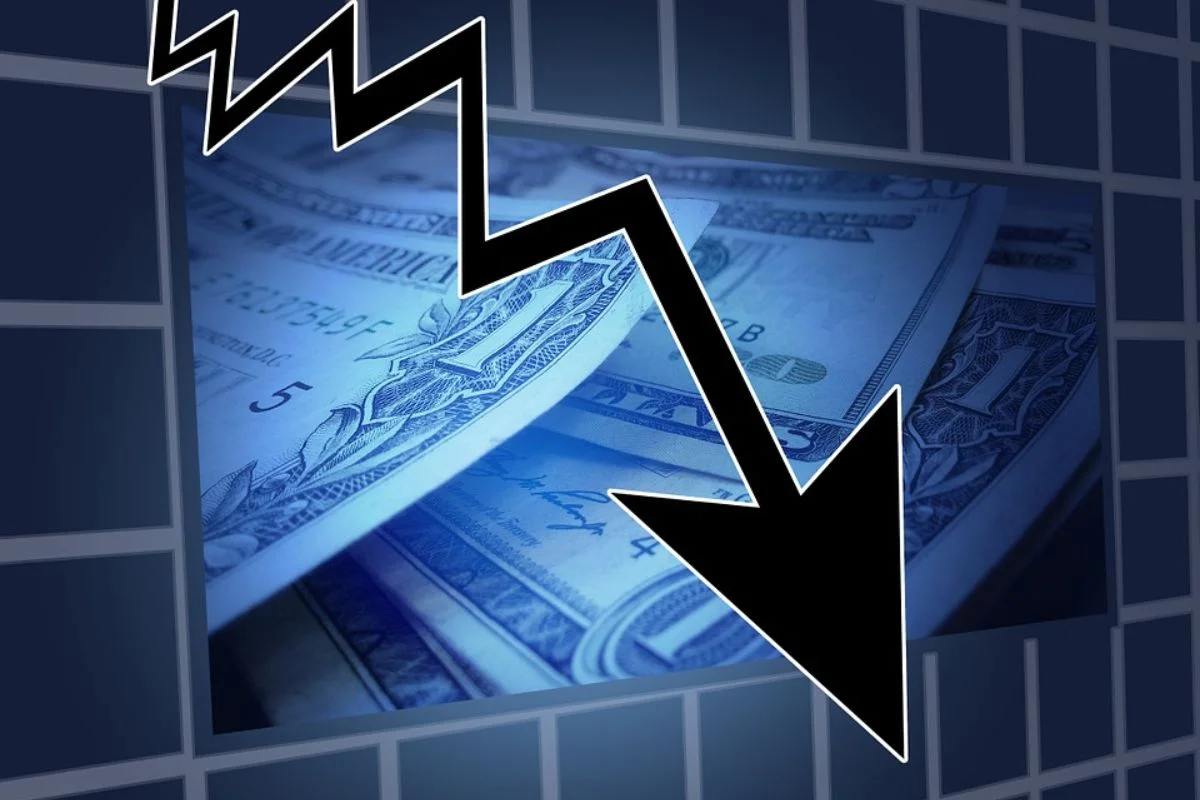 The chief economist of the IMF warned that another bailout is now ruled out / Image: pixabay
The chief economist of the IMF warned that another bailout is now ruled out / Image: pixabay
The chief economist of the IMF warned that, given the mountain of debt, another bailout as in the past is now ruled out. The consequences of this for capitalism are calamitous.
Chinese capitalism, which previously played a key role in helping to bail out the system, is now facing its own crisis. From a factor of stability, it has become one of instability, as the Chinese ruling class’ strategic interests collide with those of the USA.
In the war in Ukraine, which is a proxy war of the US and NATO against Russia, the tide is turning against western imperialism. While Russia has largely bypassed the West’s sanctions, it has strengthened its position and placed its economy on a war footing.
At the same time, there are growing divisions in the West over further economic support for Ukraine. Given this outcome, the United States is facing another Afghanistan-style humiliation, which will send shockwaves through its allies around the world who look to the US for defence and leadership.
The Ukraine war has pushed up energy costs, stoked inflation, disrupted world trade, and has simply added to the increased turbulence on a world scale.
The war in Gaza has become a catalyst for all the accumulated discontent in society, and has resulted in a massive radicalisation everywhere, especially among the youth, with tens of millions taking to the streets.
Polarisation
Society has never been so polarised as it is today, as the centre ground disappears. In the United States, where there has been a revival of the class struggle, the situation has not been so socially polarised since the Civil War in the 1860s.
In an unprecedented fashion, in different countries, the ruling class has lost or partially lost control of the situation. This is graphically illustrated in the case in the United States, where the maverick reactionary Trump has taken over the Republican Party, a key institution of US capitalism.
 In the United States, the situation has not been so socially polarised since the Civil War in the 1860s / Image: The Communist
In the United States, the situation has not been so socially polarised since the Civil War in the 1860s / Image: The Communist
Given the growing disillusionment with Biden, Trump could be returned as president in 2024, with all the turmoil that would produce in America and internationally.
The establishment is desperately trying to block his path, but with little success. In fact, the more they attack him, the more his support increases.
By every measure, the ruling classes are hurtling towards disaster at a time when the working class is beginning to reawaken and move into action.
Most importantly, this objective crisis of the capitalist system is having a massive impact on consciousness. Never before have establishment institutions, in all countries, been so widely discredited and hated.
Large layers, mostly of the youth, are drawing revolutionary conclusions and are attracted to communism. This is the decisive feature of the period.
Crisis of British capitalism
The position of British capitalism is dire. The decline of Britain can be seen in our daily lives. This once mighty workshop of the world has been reduced to a shrinking third-rate power; a satellite of US imperialism.
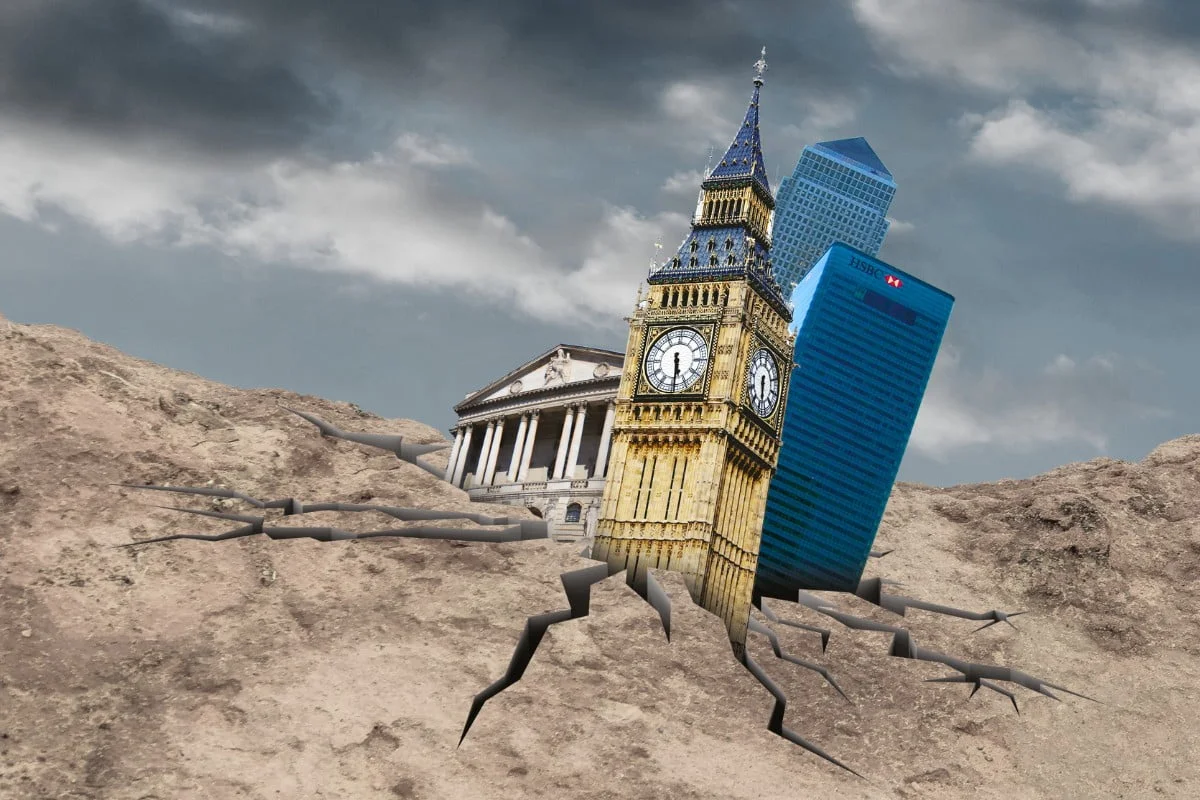 This once mighty workshop of the world has been reduced to a shrinking third-rate power / Image: The Communist
This once mighty workshop of the world has been reduced to a shrinking third-rate power / Image: The Communist
The demise of British capitalism is truly astounding. The economy is growing more slowly than at any time since the 1920s: slower than in the Great Depression; slower than in the midst of a world war; slower than the period of post-war reconstruction; slower than the economic crises of the 1970s and ‘80s.
The long-term rot in the roots of British capitalism has now penetrated new depths. It is an existential, rather than a cyclical, crisis.
This collapse of British capitalism relative to its competitors is largely due to the failure of the capitalists to reinvest their profits into modernising industry. They instead ploughed their money into financial services and various forms of speculation.
In the 40 years to 2022, the UK’s fixed investment rate was the lowest among G7 member countries. The OECD average of public investment is also nearly 50 per cent higher than that of the UK.
As a consequence, Britain has fallen further and further behind its rivals.
Permanent slump
According to the OECD, between 1993 and 2007, real GDP per head rose by 46 percent in the UK, stimulated by a growth in world trade. By contrast, between 2007 and 2022 real GDP per head in the UK rose by only six percent.
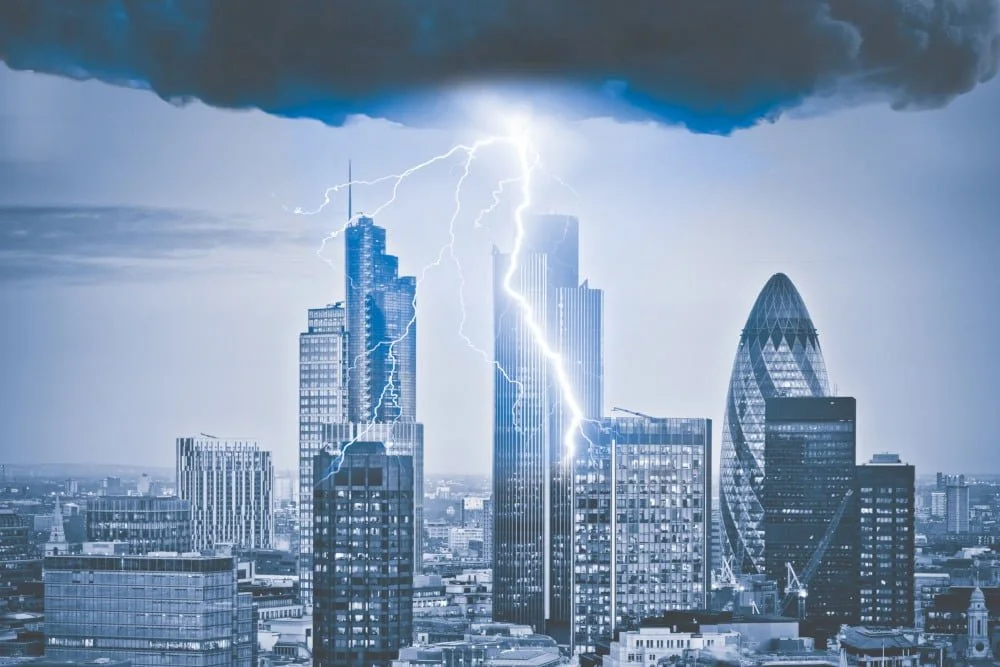 According to the Resolution Foundation, “what’s not beyond doubt is that Britain is a stagnation nation” / Image: The Communist
According to the Resolution Foundation, “what’s not beyond doubt is that Britain is a stagnation nation” / Image: The Communist
As a result, incomes have fallen well behind those in peer countries: by 2018, median household incomes were 48 percent higher in Canada, 37 percent higher in Australia and 20 percent higher in Germany.
Low-income households were some 27 percent poorer in Britain than in France or Germany.
Inequality surged in the 1980s and has remained high ever since. It is higher in the UK than in any other large European country.
According to James Smith, research director at the think-tank Resolution Foundation, whatever the debate about whether Britain is currently in a recession, “what’s not beyond doubt is that Britain is a stagnation nation”. He said that growth over the past 18 months was the weakest outside of a recession on record.
“The country’s economic prospects remain quite bleak, frankly — we are treading water,” said Jagjit Chadha, director of the National Institute of Economic and Social Research.
“Given the UK’s low productivity, I suspect growth will be imperceptible for the rest of the decade.” In other words, the British economy will be in a permanent slump.
Political volatility
As Martin Wolf, chief economist at the Financial Times, explained:
“The resulting combination of low growth with high inequality is toxic. The young have never experienced the progress in pay that their parents did.”
“Unfortunately, these difficulties are set to get worse. The combination of ageing, geopolitical tensions, Brexit, higher interest rates, and the energy transition will raise pressures on the economy and public spending at a time when the tax burden is already at historically high levels and public debt is already close to 100 percent of GDP.” (FT, 5/12/23)
 This long-term decline and demise of British capitalism will have earth-shattering consequences for the future and is preparing the ground for revolutionary convulsions / Image: The Communist
This long-term decline and demise of British capitalism will have earth-shattering consequences for the future and is preparing the ground for revolutionary convulsions / Image: The Communist
This strategist of capital concludes: “The economy is not delivering the prosperity the great majority desires. As the country falls behind, unhappiness will grow.”
But unhappiness and discontent is already widespread. This explains the political volatility: the rise of Scottish independence in 2014, the collapse of Labour in Scotland in 2015, the rise of Corbynism, the Brexit vote, the rise and fall of Boris Johnson, etc.
Britain has gone from being perhaps the most stable country in Europe just over 10 years ago, to possibly the most unstable today.
Schools are crumbling, the NHS is collapsing, councils are going bankrupt, services are being cut, wages are declining, the housing crisis is deepening and living standards are falling. There is a general malaise in Britain.
In particular, there is record disillusionment in capitalist politicians and institutions such as the police, the monarchy, and the media. All of this is a symptom of the general crisis of the regime.
In the past, Britain was regarded as very conservative. It was where the religion of capitalist progress had sunk the deepest. But not anymore. Things have been turned on their head.
This long-term decline and demise of British capitalism will have earth-shattering consequences for the future and is preparing the ground for revolutionary convulsions.
Defeat of the Tories
With the degeneration of British capitalism has come the degeneration of the capitalist class and its political representatives. The Tory Party, once the most successful bourgeois party in Europe, has become a laughing stock.
The rise of the rank-and-file members of the Tory shires, who can now decide the leader, led to the calamity of Boris Johnson, then Liz Truss. The ruling class has lost control over the Tory Party, which is only adding to the crisis, as their support for Brexit showed.
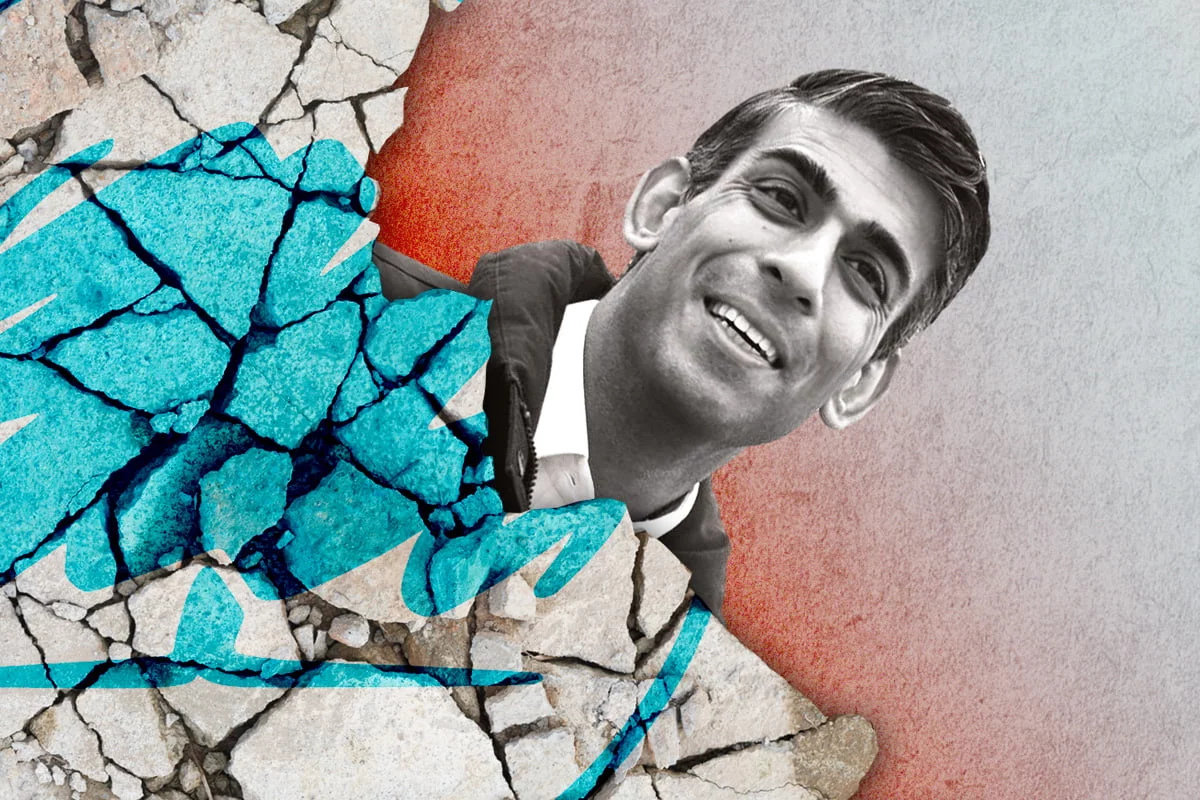 The Tory Party, once the most successful bourgeois party in Europe, has become a laughing stock / Image: The Communist
The Tory Party, once the most successful bourgeois party in Europe, has become a laughing stock / Image: The Communist
The bourgeoisie managed to impose Sunak as leader without a vote in an effort to stabilise the situation. However, the Tory Party is plagued with factions, which throw their weight around and destabilise the party and government.
Sunak has to engage in a precarious balancing act, as witnessed over the Rwanda deportation scheme. But the likes of Suella Braverman and Kemi Badenoch are busy manoeuvring with an eye on a future leadership bid, when the party is inevitably defeated at the next election.
With its electoral defeat, there will be a further shift to the right within the Tory Party, as with the Republicans in the US. We will witness a ‘Trumpianisation’ of the Tory Party, which is likely to suck in individuals of the Nigel Farage ilk.
The party will become even more reactionary, especially using the card of immigration and other ‘culture war’ issues to whip up division. The ‘One Nation Tories’ will be even more isolated. Some will desert to Starmer’s Labour Party.
It is no accident that the likes of Rory Stewart, the former cabinet minister who ran for the leadership of the Tory Party in 2019, has declared he would be interested in serving in a Labour government led by Sir Keir Starmer.
Crisis Starmer government
A general election is set to take place in 2024. With the opinion polls putting Labour well ahead, it is most likely we will have a right-wing majority Labour government.
The ruling class have no alternative but to rest upon the right-wing Labour leaders, who in turn are keen to do their bidding. The scene will be set for class battles and rising radicalisation, as Starmer continues where the Tories left off.
A new feature is the reawakening of the working class, as witnessed by the waves of strikes over the past two years. New layers have been drawn into battle.
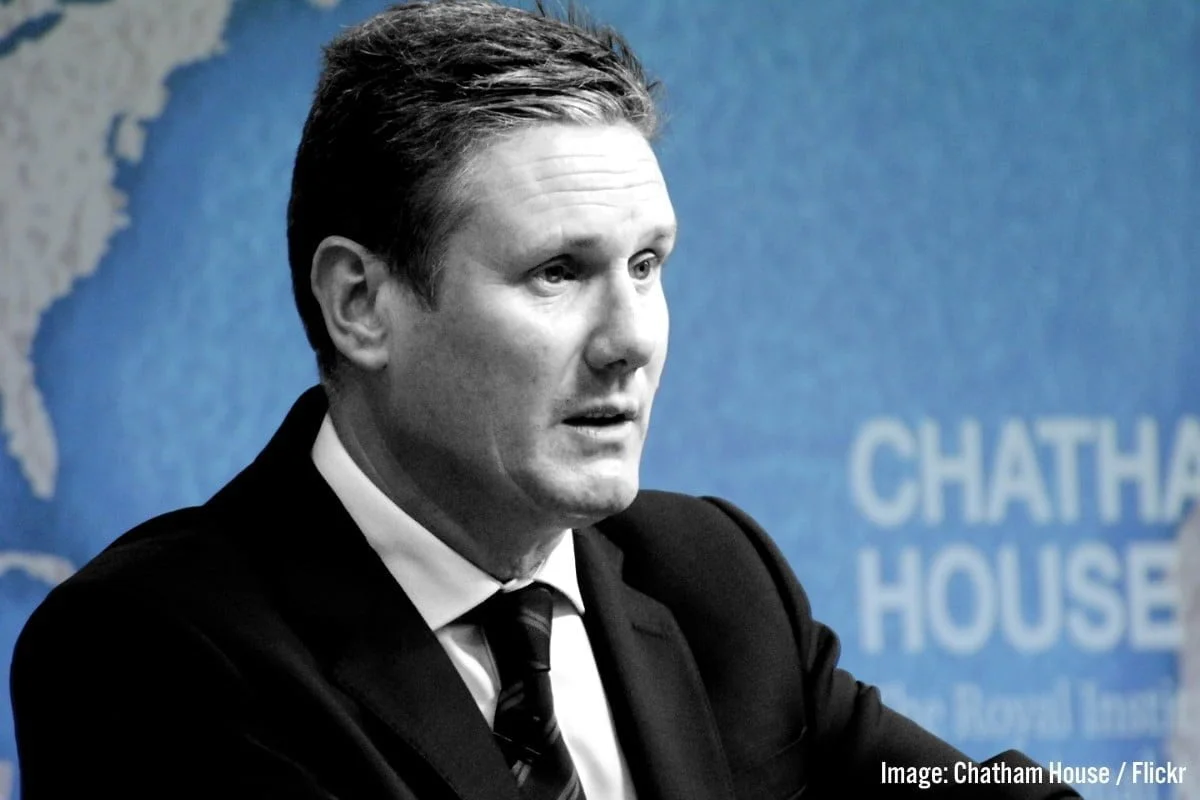 The Starmer government will be a government of crisis / Image: Chatham House, Flickr
The Starmer government will be a government of crisis / Image: Chatham House, Flickr
With living standards being eroded, and inflation still high compared to the past, there will be little willingness to accept further cuts. The pressures will mount in the trade unions to hold the line, pushing one sector after another into struggle.
The Starmer government will be a government of crisis. It will be under pressure from both the working class and the capitalists to deliver policies in their interests.
But given the crisis-ridden state of British capitalism, Starmer will offer not reforms, but counter-reforms. He has fully embraced orthodox capitalist economic policy, which means austerity and ‘balanced budgets’.
It will in reality be a capitalist government, little different from the Tories.
At the same time, there are few illusions amongst workers and youth towards a Starmer government, which will become increasingly hated.
Backlash
The crisis of capitalism is also a crisis of reformism.
As a result, the trade unions will be pushed into opposition or semi-opposition to the Labour government, given the pressure from below. It is important that our party finds a road to the young workers who will be pushed to the forefront and who want to fight.
On foreign policy, we have already seen how Starmer is firmly in the pockets of the imperialists, especially American imperialism. This too will cause a mighty backlash given the developing crises around the world.
The alienation and anger of the Muslim and Asian population towards Starmer’s stance over Gaza is an indication of the upheavals to come.
In Scotland, the SNP are entering into crisis, rocked by scandals and forced to carry through massive austerity to balance the books. Their offer of ‘independence’, blocked by the Tory government and the courts, has run into the sand.
They are however likely to temporarily benefit from the unpopularity of Starmer’s government. Nevertheless, having gone through the experience of reformism and nationalism, the banner of communism will become increasingly popular given the crisis, especially among the youth, as elsewhere in Britain.
In Wales, the Labour administration, in cooperation with Plaid, has presided over a declining economy, in which industry has been gutted. More budget cuts will push Wales further down the road of austerity and reveal the limits of reformism. As elsewhere, the Welsh workers will take to the road of struggle.
Communist ideas
With the growing discontent in society, the scene is being set for big class battles and great shifts in consciousness.
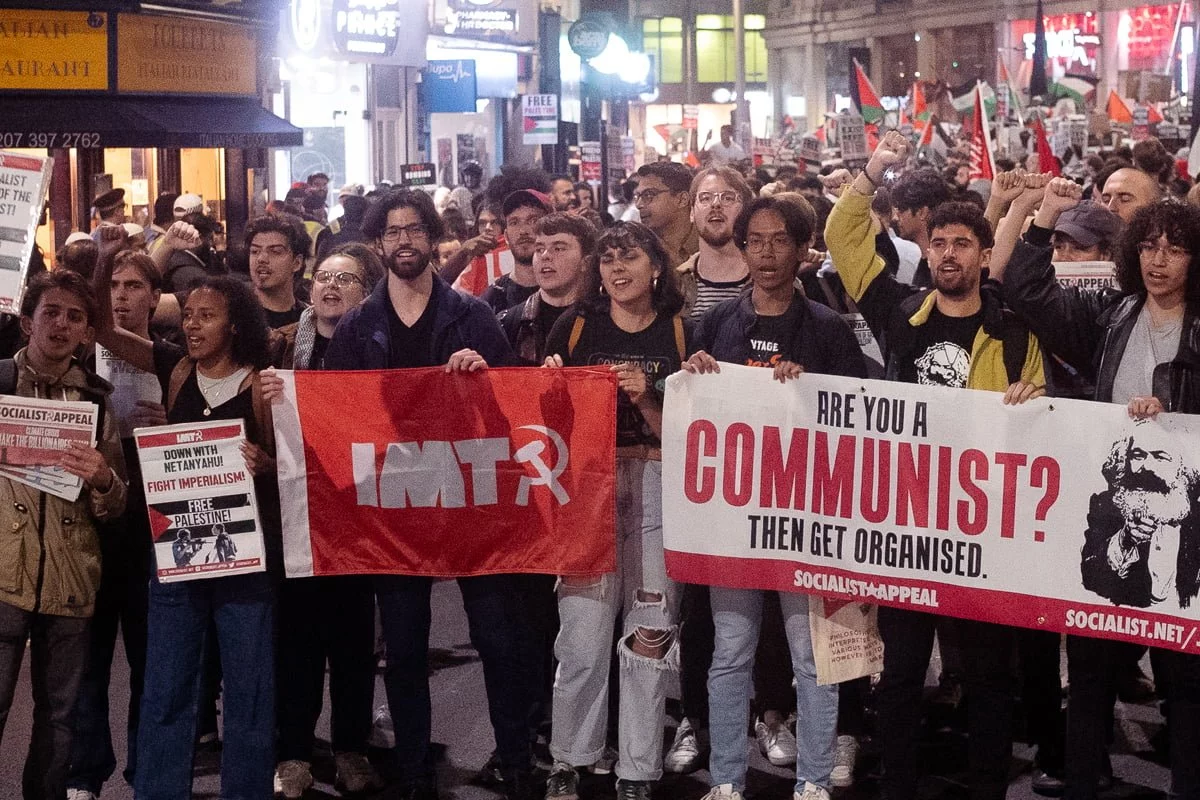 The youth are completely open to radical, revolutionary, and especially communist ideas / Image: The Communist
The youth are completely open to radical, revolutionary, and especially communist ideas / Image: The Communist
The ‘lefts’ in the trade unions and Labour Party will begin to raise their heads, but will offer no more than the stale outdated policies of Keynesianism. All are wedded to the capitalist system and believe it can be ‘reformed’ by tinkering at the edges.
They have degenerated politically compared even to the ‘lefts’ of the past. They completely accept capitalism. They are characterised by vacillation, weakness, and capitulation. Inherent in reformism, explained Trotsky, is betrayal.
The younger generation, meanwhile, who have known nothing but austerity and capitalist crisis, will be looking far beyond such piecemeal ‘solutions’. The reformist politicians are increasingly exposed for what they are.
Figures like Jeremy Corbyn will not be a point of reference for this generation. Instead, the youth are completely open to radical, revolutionary, and especially communist ideas. Millions more will be open to these ideas. According to the Fraser Institute report, there are around 4.5 million open to communism in Britain alone.
This period of sharp and sudden changes will mean swings to the left and swings to the right. This is especially the case where there is no real alternative being posed by the official leaderships. But these will give way to even bigger swings to the left.
In such a period, in the past, the old so-called Communist Party would have grown substantially, given its name. But it is steeped in reformism and nationalism, and has been reduced to a shadow of its former self. It spreads illusions about the United Nations and offers pacifism instead of revolutionary politics. If people join, they quickly leave given the party’s reformist politics.
Given this political vacuum, all sorts of phenomena and movements could appear in the period ahead, as workers and youth look for an alternative to the hated traditional parties and politicians. But without any clear ideas or perspectives, these will necessarily be ephemeral in character. Nevertheless, our party should be prepared to respond to any such developments.
Revolutionary Communist Party
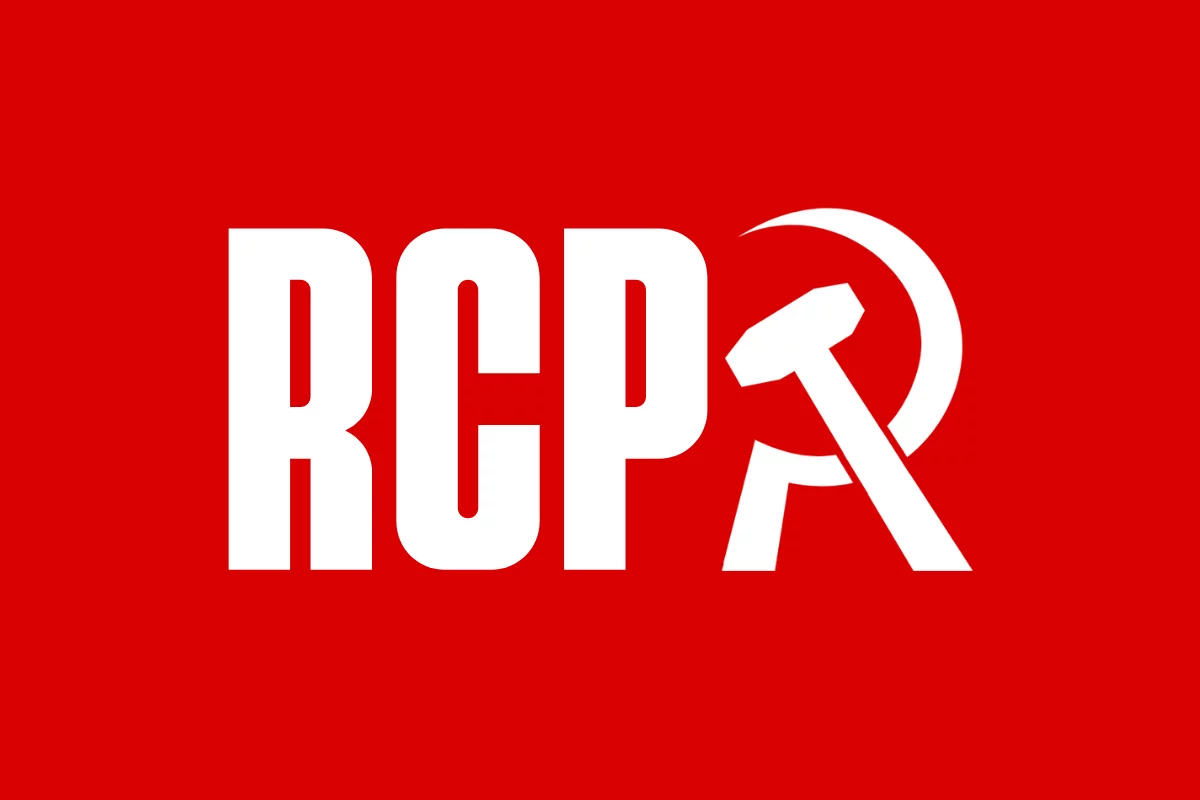 The new Revolutionary Communist Party (RCP) can become a pole of attraction for all those seeking a genuinely revolutionary road / Image: The Communist
The new Revolutionary Communist Party (RCP) can become a pole of attraction for all those seeking a genuinely revolutionary road / Image: The Communist
With its bold approach, the new Revolutionary Communist Party (RCP) can become a pole of attraction for all those seeking a genuinely revolutionary road. But to do so we need to step up.
We are entering a pre-revolutionary period in Britain. This is likely to be protracted over many years. Under the hammer blows of events, consciousness will develop in a revolutionary and communist direction.
The extraordinary success of the Are You a Communist? campaign we launched in 2023 is a clear example of the possibilities. We are the only ones who have recognised the potential to build a communist party by appealing to people on a directly communist basis. And yet we are only scratching the surface.
The RCP must adopt a bold approach and flexible tactics if it is to succeed. We do not write off the reformist mass organisations, which can be transformed by events.
In any case, the more rapidly we build the RCP today, the better we will be able to intervene in any future possibilities that do emerge in the mass organisations.
We must adopt the adage: full strength to the point of attack. We must therefore face towards those most open to revolutionary ideas and win them to the revolutionary party.
The youth, of course, is the key. As Lenin explained, he who has the youth has the future.
Revolutionary ideas
Most of the far left sects have over the past period watered down their ideas in an attempt to find a shortcut to building a revolutionary organisation. This has completely failed.
We turn our backs on these opportunist sects and look instead to the fresh revolutionary layers. In doing so, we reject wholeheartedly petty-bourgeois identity politics and declare war upon all alien class ideas.
We have the correct ideas. They are our most powerful weapon. Our aim is to assemble the forces to prepare the working class for power. The world is going to be convulsed with revolutionary developments, as is Britain.
We must prepare ourselves seriously – theoretically, politically, and organisationally – for this.
The British working class has a long and proud history of struggle. It must relearn its revolutionary traditions, beginning with physical force Chartism.
Our tasks
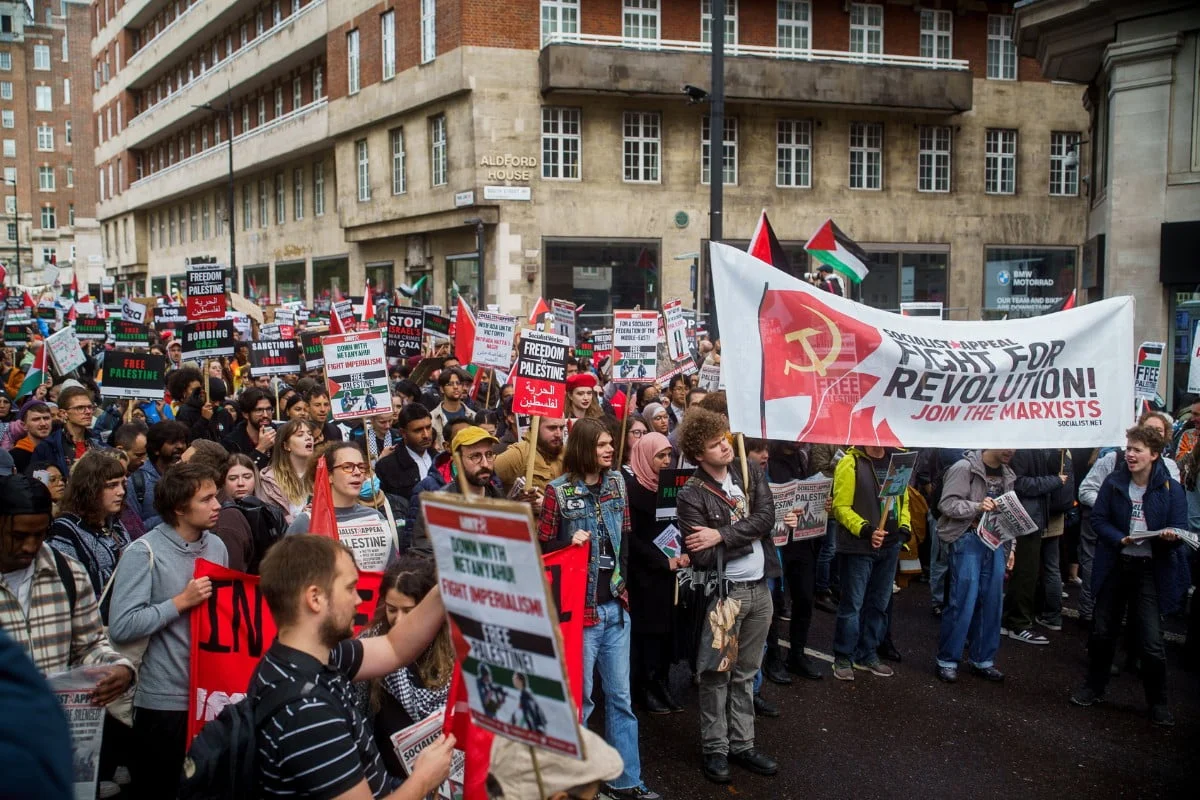 We must find our way to the first 10,000, and from there to become a mass party / Image: The Communist
We must find our way to the first 10,000, and from there to become a mass party / Image: The Communist
We have made great strides forward. Yes, we have weaknesses, which we will overcome by common effort. We need to educate and steel ourselves for the events that impend.
We must set ourselves the goal of reaching 5,000 and then 10,000 members in a measurable short space of time. The objective situation demands it. This will allow us to build a base in every locality, workplace, and trade union.
In the revolutionary storms that lie ahead, a small revolutionary party can emerge onto the scene and rapidly grow amongst the working class.
Such was the case with the Spanish POUM, a centrist organisation (i.e. one that wavered between reformism and revolution), which grew from about 2,000 members to 40,000 or 50,000 in a matter of weeks in the heat of the Spanish revolution.
We can be faced with the same spectacular growth, but with a Bolshevik programme and leadership.
As Trotsky explained at the time:
“Ten thousand, with a firm and perceptive leadership, can find the road to the masses, break them away from the influence of the Stalinists and Social Democrats, the charlatans and loudmouths, and assure them not just the episodic and uncertain victory of the republican troops over the fascist troops, but a total victory of the toilers over the exploiters.
“The Spanish proletariat has shown three times that it is able to carry out such a victory. The whole question is in the leadership!”
The comrades of the RCP must face up to this challenge. If you have not yet joined us, we appeal on you to do so. Every member must raise themselves to the understanding that the key to the British revolution lies within our hands.
We must find our way to the first 10,000, and from there to become a mass party. On that basis the road to the masses is possible, which in turn will lay the ground for the conquest of power.
We are retying the knot of the revolutionary traditions of the old RCP. As Ted Grant wrote:
“Revolutionary audacity can achieve everything. The organisation must consciously pose itself and see itself as the decisive factor in the situation.”
In this Year of Lenin, there has never been a more important task.


